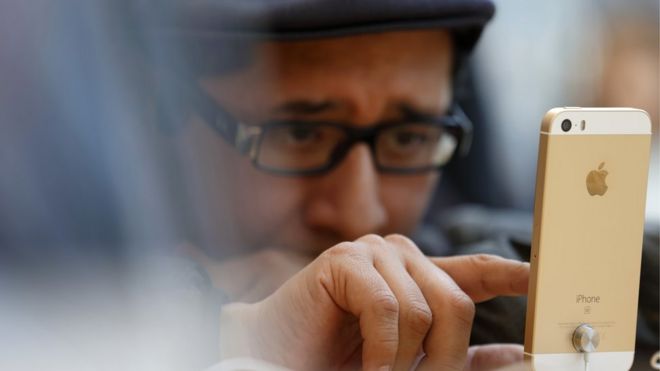
Apple reported a 13% drop in its second quarter revenue on Tuesday as sales of iPhones slipped.
The technology giant reported quarterly sales of $50.56bn (£34.39bn) down from $58bn last year – the first fall in sales for the company since 2003.
Apple sold 51.2 million iPhones during the quarter, down from 61.2 million in the same quarter of 2015.
China was a particular weak spot – sales there fell 26%. Results were also hit by the impact of a stronger dollar.
Apple shares fell 8% in after hours trading. Its shares have fallen close to 20% over the last twelve months.
Apple’s chief executive Tim Cook said the company performed well “in the face of strong macroeconomic headwinds”.
Slowing sales in established markets hasn’t been too much of a problem for Apple, as China has always been there to prop up its earnings and keep it posting quarter after quarter of record breaking profits.
But with revenues in China taking a hit, the whole company suffers.
The iPhone – the most successful technology product in history – is now officially in decline. The company had warned as much three months ago, but to see the numbers for real will give investors cause for concern.
Some have been calling recent events a sign that we’re coming to the end of a golden age for hardware makers. The smartphone boom is past its extraordinary peak.
Apple, perhaps more than any other company, needs the next blockbuster category to come along. The Apple Watch is bringing in an estimated $1bn each quarter, but that’s not enough. It needs another smash like the iPhone. But there’s no sign of one coming any time soon.
Apple’s quarterly profit slipped to $10.5bn from $13.5bn.
Nevertheless, it announced it would return $50bn to shareholders through an increase in share buybacks and a 10% increase in quarterly dividends.
Back in January the company warned that it was experiencing its slowest-ever increase in orders for iPhones and that this would cut into second quarter earnings.
Declining growth in smartphone sales has had an impact on the entire industry and companies are struggling to find the next area of innovation.

“The industry is in a lull between the mobile boom and what comes next in automotive, the connected home, health and industrial applications of the internet of things,” said Geoff Blaber, from CCS Insight.
One bright spot for Apple was its services unit, which includes App Store downloads, Apple Pay and Apple Music. The division experienced a 20% growth compared with the same quarter in 2015.
However, growth at that unit could be threatened by a new law in China passed in March. It requires all content shown to Chinese people to be stored on servers based on the Chinese mainland.
As a result Apple’s iBooks and iTunes movies service were shut down in the country.
Apple said it hoped access to the services would be restored soon.
Apple was recently in a standoff with the US government over whether the company should help the FBI unlock an iPhone.
The FBI wanted Apple to build a program to unlock the iPhone of San Bernardino shooter Syed Rizwan Farook.
Apple refused, calling the government’s order a violation of its rights. The FBI eventually turned to outside hackers to break into the phone. – BBC



